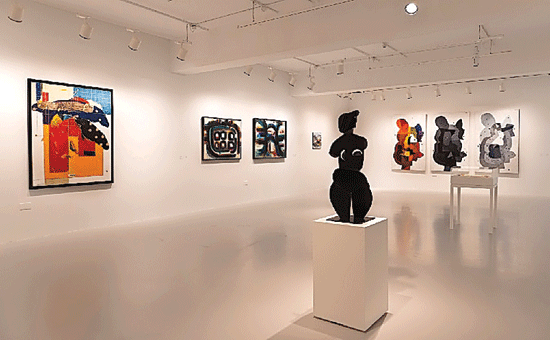

DOHA: Five of the Arab world’s most ground-breaking and influential modern and contemporary artists are featured at the “Focus: Works from the Mathaf Collection” which opens to the public tomorrow at Mathaf: Arab Museum of Modern Art.
The exhibition on the ground floor features works by pioneering artists from the museum’s Permanent Collection, including Faraj Daham (Qatar), Saloua Raouda Choucair (Lebanon), Inji Efflatoun (Egypt), Farid Belkahia (Morocco) and Abdulhalim Al Radwi (Saudi Arabia).
Running until February 14, the expo offers a glimpse into some of the museum’s most iconic works by combining a series of solo shows that highlight key artists in the collection.
Each gallery on ground floor exhibition space is dedicated to one artist and touches upon specific themes in their practice, allowing visitors to experience their productions through the lens of curatorial interpretations of historical contexts, materials and aesthetics, while interrogating the museum’s role by building academic and curatorial research on the Permanent Collection.
The exhibition also offers diverse curatorial interpretations, with one of five curators assigned to each solo show. These are Mathaf Director Abdellah Karroum, Mathaf curators Laura Barlow, Fatma Mostafawi and Leonore-Namkha Beschi, and independent curator Mayssa Fattouh.
Karroum said: “We are delighted to be presenting this ongoing series of solo exhibitions at Mathaf which give visitors a more in-depth glimpse into the work of some of the Arab world’s most significant artists featured in our Permanent Collection, reflecting a multitude of artistic directions and contexts. The role of this series is not only to conserve art over time, but also to suggest paths for revisiting, re-experiencing, and seeing selected artworks in light of current events and curatorial readings.”
Each of the five exhibitions explores multiple artistic approaches towards major topics of modernity, including identity, invention and experimentation in art.
Daham, Efflatoun, Choucair, Radwi and Belkahia believed they had a responsibility as intellectuals to embrace historical traditions and social progress.
Their diverse backgrounds, education, interests, and dedication to social reform allowed for original yet universal creations of art. In different ways with different forms, the five artists have played a major part in generating ideas and inventing techniques as they, in conversation with international art movements and other geographies, make sense of their artistic, social and political worlds.
The Peninsula




